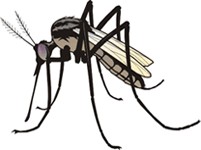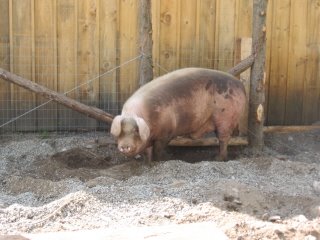
Yep, I'm going camping again this weekend, so Mother Nature can take another swing at me. Luckily, according to this article from NewScientist.com, I may soon be able to turn this hatred in my favour (at least where skeeters are concerned). Too little too late.
Some unfortunate people are irresistible to mosquitoes, while the scent of some lucky individuals drives the blood-suckers away. Now the smelly chemicals from the sweat of these lucky people have been identified by researchers, who are testing its effectiveness as a natural mosquito repellent.Everybody produces a mixture of odorous chemicals in their sweat, some of which attract biting insects, such as lactic acid. But people who do not get bitten also produce smelly chemicals that appear to mask the scent of the attractive chemicals.
This masking can offer an effective camouflage against mosquitoes, explains James Logan, who carried out the research with John Pickett at Rothamsted Research in Harpenden, and colleagues at the University of Aberdeen, both in the UK.
These helpful chemicals probably occur naturally in everybody’s sweat but some people have a much higher ratio than others, Logan says.
What is more, the same benign sweat chemicals that repel the tropical mosquitoes Aedes aegypti – responsible for spreading yellow fever throughout Africa and South America – appear also to disgust the persistent biting midge that terrorises the west coast of Scotland, the researchers discovered.
Logan constructed a Y-shaped chamber and wafted the scent of different people down two of the branches by getting volunteers to place their hands at the ends. The blood-sucking insects flew from the thin end of the "Y" towards the human hand they preferred.
He then analysed the body odour of those individuals found to be unattractive by sealing their bodies in a foil sack, tied under the chin, and collecting and distilling the sweat that poured off them.
The most potent repellent chemical were then isolated by strapping miniature electrodes to the antennae of female mosquitoes and checking their responses to specific compounds. Logan will not divulge the names of the chemicals until they are patented. But he does reveal that although the scent of the chemicals is normally undetectable by humans, they have a fruity smell when highly concentrated.
“It’s very exciting," Logan told New Scientist, "because these are totally natural chemicals with an effectiveness that compares favourably to harsher chemicals such as DEET, which is the best repellent available but has unwanted effects, including dissolving plastics.”
A key chemical identified by Logan as a repellent is also "a natural food additive, so has proven safety", he says. "And because it can be made by plants, it may one day be possible to mass produce it cheaply.”
The repellent is currently being trialled with 16 volunteers in Africa. Meanwhile, the researchers are testing the repellent against other biting insects, including malaria carrying mosquitoes.
The research was presented at the Royal Society Summer Science Exhibition in London, UK, and has been submitted to a leading peer review journal for publication.











